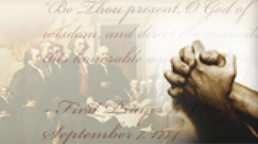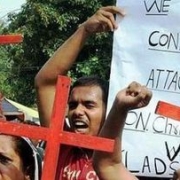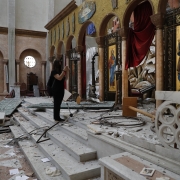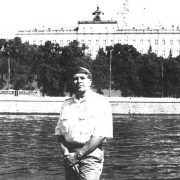Congressional Prayer Caucus stands for God and Country
 Contrary to popular belief there are many godly men in Congress and many of them, both Democrats and Republicans, are members of the Congressional Prayer Caucus. This group of more than 100 congressmen just do more than pray together each week, they take action. Below is a list of some of the issues the Congressional Prayer Caucus lead by Congressman Randy Forbes (R-VA) has been involved in. Please take a look at the official Congressional Prayer Caucus Internet site as well.
Contrary to popular belief there are many godly men in Congress and many of them, both Democrats and Republicans, are members of the Congressional Prayer Caucus. This group of more than 100 congressmen just do more than pray together each week, they take action. Below is a list of some of the issues the Congressional Prayer Caucus lead by Congressman Randy Forbes (R-VA) has been involved in. Please take a look at the official Congressional Prayer Caucus Internet site as well.Opposing hostility towards faith in the Air Force
Congressman Randy Forbes joined Congressman Diane Black and Congressman Todd Akin in sending a letter signed by 66 Members of Congress urging Secretary of Defense Leon Panetta to investigate a pattern of hostility towards faith in the United States Air Force. Over the last year, the Air Force has repeatedly capitulated to pressure from outside groups to remove religious symbols and references to faith from the service. The letter calls on Secretary Panetta to issue clear Department of Defense policy guidance, consistent with our Constitution, to preserve the place of religious expression in the military at large.
Urging the President to preserve religious hiring rights
Congressman Randy Forbes and Congressman Mike McIntyre sent a letter to President Obama, urging him to maintain current policies that allow faith-based organizations that consider religious criteria in their employment decisions to perform contract work for the federal government.
Supporting legislative prayer at the U.S. Court of Appeals for the Eleventh Circuit
Thirteen Members of the House of Representatives have joined the Family Research Council (FRC) in submitting an amicus curiae brief to the U.S. Court of Appeals for the Eleventh Circuit in support of legislative prayer. The Lakeland City Commission in Florida had a policy of inviting clergy to offer invocations at the beginning of its meetings. The Atheists of Florida sued, arguing that because most of the prayers were offered by Christian clergy, the prayers were “too sectarian” and thus violated the Establishment Clause. The brief submitted by the Members argues that courts do not have the jurisdiction to delve into the inner workings of a deliberative body’s meetings because of the constitutional separation of powers between the branches of government.
Supporting the freedom of school boards to open meeting with prayer
Members of the Prayer Caucus are supporting a resolution introduced by Congressman Tim Walberg that supports the freedom of school boards to open meetings with prayer. H.Res.662 expresses the sense of the House of Representatives that school boards are deliberative bodies similar to city and county councils and state legislatures, and should be treated as such for purposes of analyzing the constitutionality of their prayer policies.
Working to protect the symbols and traditions of Christmas
Members of the Prayer Caucus are supporting H.Res.489, introduced by Congressman Doug Lamborn, which expresses the sense of the House of Representatives that the symbols and traditions of Christmas should be protected for use by those that celebrate Christmas. Each year during the Christmas season, there are increasing efforts to remove religious symbols and references from the holiday. H.Res.489 emphasizes that the First Amendment does not require bans on religious references to Christmas, and supports the use of these symbols by those who celebrate Christmas.
Urging Vanderbilt University to protect religious student groups
In October of 2011, Congressman Randy Forbes led 22 Members of Congress in sending a letter to Chancellor Nicholas Zeppos of Vanderbilt University, urging him to ensure that the school’s nondiscrimination policy was not being interpreted in a manner that discriminated against religious student groups. Several religious student organizations at Vanderbilt, including the Christian Legal Society and the Fellowship of Christian Athletes, were placed on “provisional status” for requiring their student leaders to share the groups’ religious beliefs. Thirty-five Members then sent another letter in May of 2012, expressing continuing concern that the school’s nondiscrimination policy requires all student groups to open leadership positions to all students, yet exempts fraternities and sororities from the requirement while refusing to exempt religious student groups.
 Fighting attempts to remove “Under God” from the Pledge of Allegiance
Fighting attempts to remove “Under God” from the Pledge of Allegiance
Members of the Congressional Prayer Caucus lead in sending a letter to NBC, expressing concern over the network’s omissions of “under God” from the Pledge of Allegiance twice in a video montage aired during coverage of the U.S. Open. In response to the letter sent by 108 Members of Congress, the network reprimanded the employees responsible for the omissions and implemented safeguards to prevent similar instances in the future.
Opposing efforts to remove a memorial cross honoring military veterans
In January of 2011, a three-judge panel of the U.S. Court of Appeals for the Ninth Circuit ruled that a cross displayed at the Mount Soledad Veterans Memorial in San Diego, California was unconstitutional. Members of the Prayer Caucus signed on to an amicus curiae brief submitted to the Ninth Circuit asking the full court to reconsider the case, and asserting that the cross’s presence at the memorial is constitutional. After the Ninth Circuit declined to reconsider the case, Members joined the American Center for Law and Justice (ACLJ) in submitting an amicus curiae brief to the Supreme Court of the United States, asking the Court to take up the case and reverse the Ninth Circuit’s decision. In June of 2012, the Supreme Court announced that it would not review the case; however, Justice Alito issued a statement saying the appeal may have been premature and the Court may reconsider the case after the district court issues a final order on the fate of the memorial.
Urging religious freedom protections for service members
The repeal of the “Don’t Ask, Don’t Tell” policy in the military raised concerns that service members whose consciences or religious beliefs conflicted with homosexual behavior would face discrimination and disapproval. Members of the Prayer Caucus sent a letter to President Obama, urging that specific religious freedom and conscience protections be adopted during implementation of the repeal to formally assure all Americans that our citizens need not leave their faith at home when they volunteer to serve.
Affirming America’s rich spiritual heritage
Co-chairmen of the Congressional Prayer Caucus, Congressman Forbes and Congressman McIntyre, reintroduced legislation to recognize our nation’s religious history. H.Res.253, America’s Spiritual Heritage Resolution, affirms the rich spiritual and diverse religious history of our nation’s founding and subsequent history, and designates the first week in May as America’s Spiritual Heritage Week.
Working to decrease frivolous lawsuits challenging public expressions of religion
Members of the Prayer Caucus are supporting H.R.2023, introduced by Congressman Dan Burton, which would ensure that the legal system is not used to extort money from state and local governments through frivolous lawsuits against public expressions of religion. H.R. 2023 would not prevent parties from filing lawsuits alleging Establishment Clause violations, but it would require each side to pay its own attorneys’ fees. The bill would limit the remedies available to the suing party, so the only relief available would be that the state or local government would be required to stop its public expression of religion, if the court deems it unconstitutional. The result would be a decrease in frivolous lawsuits and the assurance that state and local governments are not intimidated into halting constitutional public expressions of religion.
Recognizing the significant impact of the Ten Commandments on America’s development
Members of the Prayer Caucus are supporting H.Res.211, introduced by Congressman Louie Gohmert, which recognizes the significant contribution that the Ten Commandments have made in shaping America’s principles, institutions, and national character. The bill supports designating the first weekend in May as “Ten Commandments Weekend.”









RE: prayer caucus. How is it possible for Democrats to be Christians?
OR, how could a Christian vote for anti-life judges, and be “righteous” enough to pray effective prayers?
Their website did not identify the members by party, but I recognized a few names, and am suspicious.